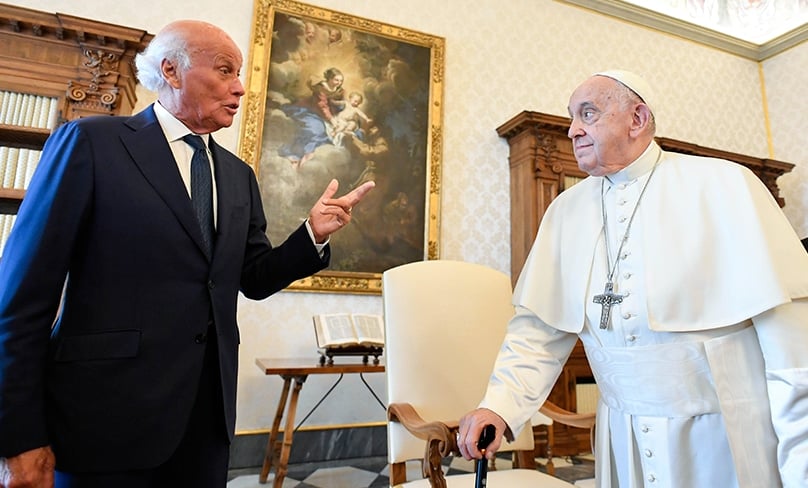
Pope Francis asked a group of Italian journalists to shun fake news and a love of scandal, including when covering the Catholic Church and the upcoming assembly of the Synod of Bishops.
“Help me to narrate this process for what it really is, leaving behind the logic of slogans and pre-packaged stories,” he asked the group on 26 August as he accepted the “È Giornalismo” prize, which recognizes outstanding contributions to journalism.
Pope Francis told the group he realises how “speaking of a ‘synod on synodality’ may seem something abstruse, self-referential, excessively technical, of little interest to the general public,” but the whole process, which began in 2021 with listening sessions on the local, national and regional levels “is something truly important for the church.”
At a moment in history “when there is much talk and little listening, and when the sense of the common good is in danger of weakening,” he said, “the church as a whole has embarked on a journey to rediscover the word ‘together.'”
All the baptised must “walk together, question together, take responsibility together for communal discernment, which for us is prayer, as it was for the first apostles: this is synodality,” the pope told the group.
The synod assembly between 4-29 October at the Vatican, he said, will bring together bishops, priests, religious and laypeople from around the world with the purpose of “listening together, discerning together, praying together.”
With so much of the world experiencing a “culture of exclusion,” the pope said, the church can model a better way, one in which everyone finds a welcome and no one echoes the prayer of the pharisee in Luke’s Gospel who says, “I thank you, Lord, because I am not like this, I am not like that” rather than thanking God for his gifts.
Pope Francis explained to the group that St Paul VI reinstituted the Synod of Bishops at the end of the Second Vatican Council “because he realised that in the Western church synodality had disappeared, whereas in the Eastern church they still have this dimension.”
“Please, let us get used to listening to each other, to talking, not cutting someone’s head off over a word,” but rather learning “to listen, to discuss in a mature way.”
“This is a grace we all need in order to move forward. And it is something the church today offers the world, a world so often so incapable of making decisions, even when our very survival is at stake,” Pope Francis said.
The Catholic Church, he said, is “trying to learn a new way of living relationships, listening to one another in order to hear and follow the voice of the Spirit.”
“We have opened our doors, we have offered everyone the opportunity to participate, we have taken into account everyone’s needs and suggestions,” he said. “We want to contribute together to building a church where everyone feels at home, where no one is excluded.”
The church is for everyone, he said. “There are no first-, second- or third-class Catholics, no. All together. Everyone. It is the Lord’s invitation.”
